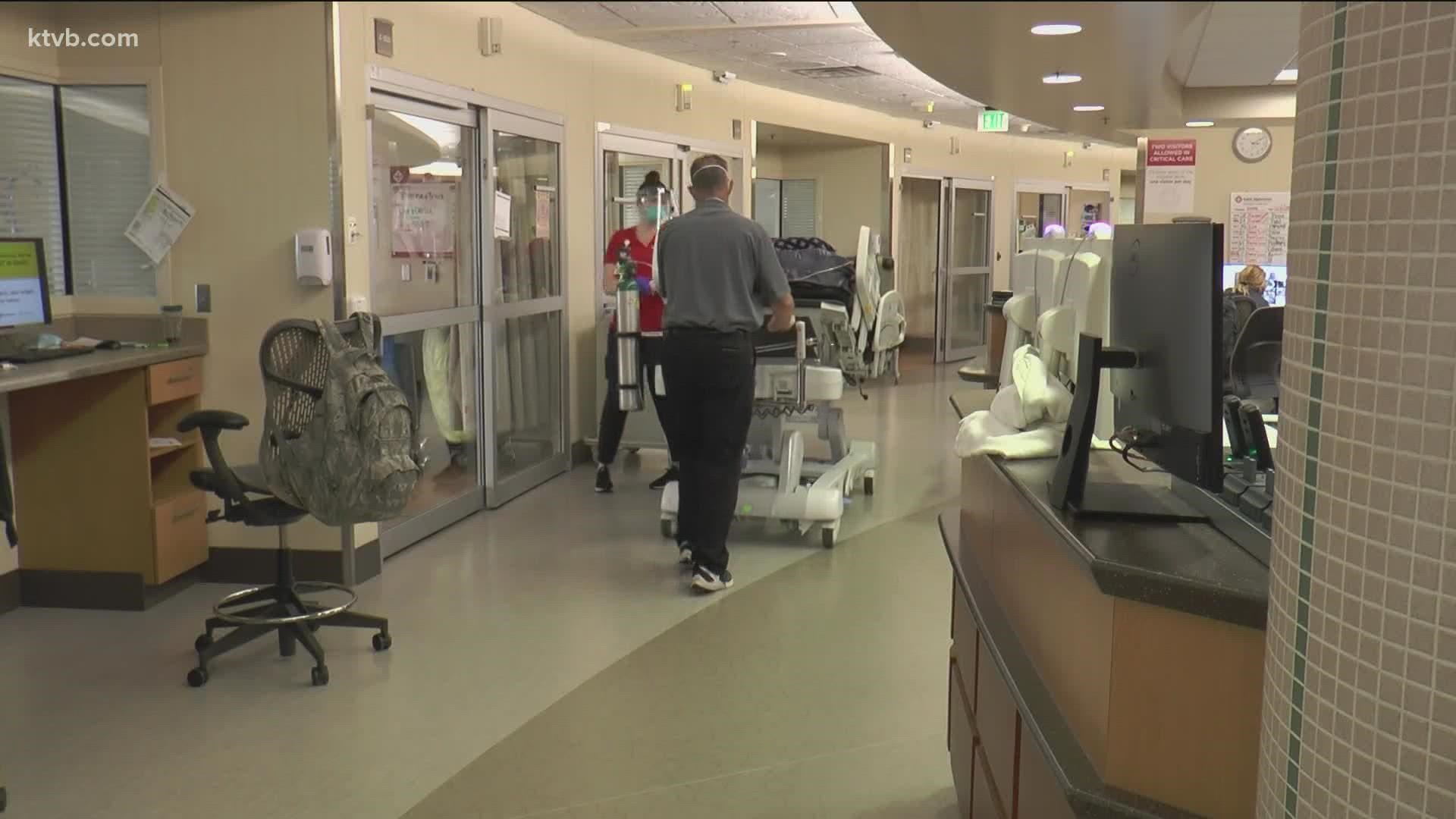BOISE, Idaho — Note: The video above is from a Jan.25 story about the shortage of blood and staff affecting Idaho hospitals.
As hospitals in southwest Idaho are again staring down the barrel of crisis standards of care as the COVID-19 pandemic continues, doctors from St. Luke's and Saint Alphonsus attempted to convey the seriousness of their situation to the Idaho Legislature.
Idaho Department of Health and Welfare Dave Jeppesen said a shortage of blood products and a high rate of staff out sick drove the latest crisis standards of care designation, which comes amid a surge in the highly-infectious Omicron variant of the virus.
Crisis standards were declared for Southwest District Health, Central District Health, and South Central District Health on Jan. 24.
Speaking to the House Health and Welfare Committee Thursday morning, Dr. Steven Nemerson of Saint Alphonsus said the hospital system routinely had about 125 staff members out sick with COVID-19 daily.
With the surge in patients, he said, Saint Alphonsus needed every one of those employees back and would hire an additional 100 people immediately if they were available.
"These people don't exist to hire, because they are all over the country being taken up by every other hospital and health system that has the same issue," Nemerson told lawmakers.
The hospital staff that remain are being pushed to their limit by the latest surge, he said.
"We have lost sight of the trauma that our healthcare providers are experiencing by virtue of witnessing death every day, due to COVID, personal sacrifices that they are making by taking extra shifts and caring for more patients than they have ever cared for in their lives," he said.
In response to questioning from a lawmaker who asked why employees are getting sick if they are masked and vaccinated, Nemerson explained that the data showed that nurses, doctors, and other staff were getting infected out in the community, not at their workplace. Breakthrough cases are more common among the vaccinated with the Omicron variant, he added, although those who end up in the hospital or dying from the virus are still almost all unvaccinated.
Nemerson said even the mild cases of COVID-19 can hit hard for a hospital worker who has been driven to the point of exhaustion for months.
"The vaccine is highly protective against hospitalization and death with this omicron variant, but it does not preclude the ability to acquire the virus and have what would normally be a mild illness," he said. "And then, somebody who is very tired, somebody who hasn't taken care of themselves, they can be weakened for a longer period of time or have a more debilitating circumstance."
St. Luke's Chief Physician Executive Dr. Jim Souza said that "quality of care was eroded for everyone" during the last crisis standards declaration in Fall 2021, when the Delta variant was dominant. Hospitals were able to avoid making life-or-death allocations between patients, he said, but necessary surgeries were canceled or put off, management of chronic illnesses were delayed, and dangerously ill people were ventilated by hand - sometimes for hours - due to the demand on staff and equipment.
"We never had to apply them due to the, frankly, creativity, innovation, and incredible sheer human effort of our healthcare teams. I have never witnessed such dogged persistence in the pursuit of a service mission in my career," he said. "And I remind us that it came on the heels of a preceding 18 months of hard work and surges. And now, unfortunately, we find ourselves back in another surge."
St. Luke's currently has a surgical backlog of 9,000 cases, and just two ICU beds left unoccupied - out of 56 - in the Treasure Valley, Souza said. Although the situation has improved slightly, he added, at the worst of the blood shortage, the hospital was just one major transfusion away from running out entirely.
"We just had good fortune, and that did not happen," he said. "We are, however, still rationing blood."
At KTVB, we’re focusing our news coverage on the facts and not the fear around the virus. To see our full coverage, visit our coronavirus section, here: www.ktvb.com/coronavirus.
Facts not fear: More on coronavirus
See our latest updates in our YouTube playlist:

